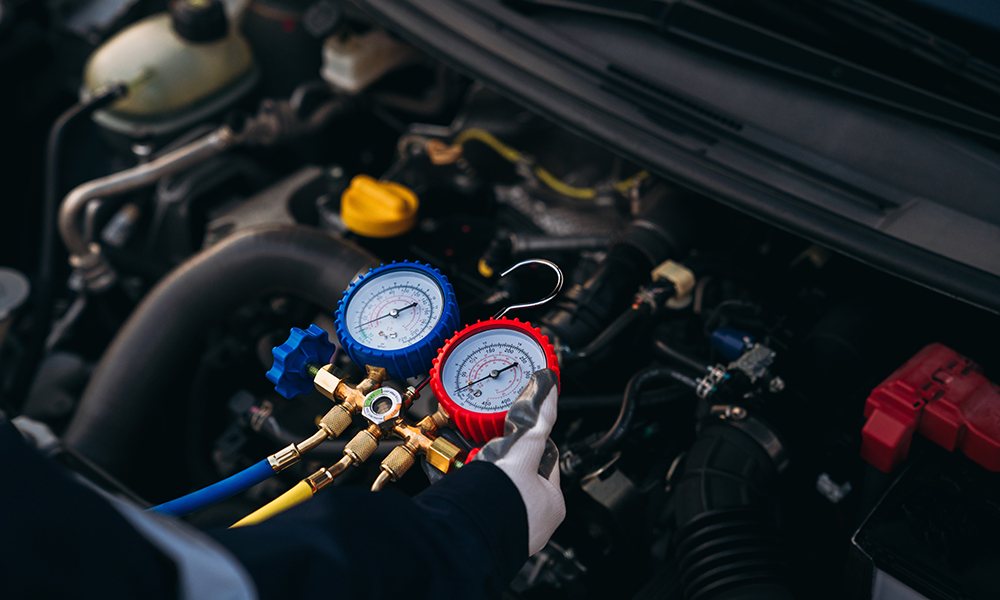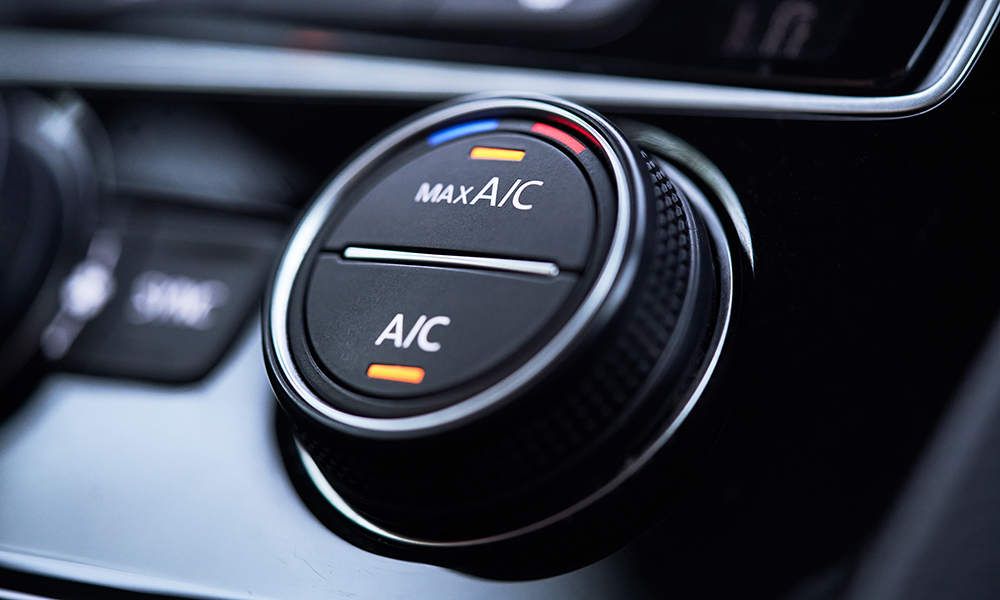What Air Con Gas Do I Need?

Stepping into your car after it’s been baking in the sun all day can feel like stepping into an oven. We’ve all been there before.
But what makes the discomfort that bit worse is when you flick on the air conditioning and it just won’t cool things down. Turns out you forgot to get your aircon regassed last summer. Its moments like these when the importance of proper aircon maintenance hits home.
But have you considered that there’s different types of aircon gas? And if not, which air con gas do you need to keep your vehicle cool and comfortable? Let’s explore the options so you can ensure your car stays cool even on the hottest days.
Aircon Gas Types: Understanding The Options
R134a Air Con Gas
Once the standard gas you’d find in your car air conditioning systems, R134a has faced scrutiny due to its high Global Warming Potential (GWP). In response, the European Union enacted a ban on its use in new car models starting in 2011, triggering a gradual global phase-out.
However, if your car still uses R134a, don’t worry – you can still find this aircon gas on the market, and it will continue to be available for some time. However, make sure to keep your eyes out for any updates as this is likely to be harder to get your hands on as we continue to reduce the world’s usage of R134a.
R1234yf Air Con Gas
So, we’re saying goodbye to R134a, but what’s the alternative? Enter R1234yf, also known as HFO-1234yf, the refrigerant gas designed as an eco-friendly alternative to R134a. First rolled out in 2015, this new refrigerant quickly gained traction for its markedly lower environmental impact. Remarkably, R1234yf generates 98% fewer climate-damaging pollutants than its predecessor.
By 2017, legislative mandates required all new car models to adopt this more economical and environmentally friendly gas. Before it became a legal requirement, many car manufacturers had already begun to make the switch – great news for the environment. Today, you’ll find a mix of cars on the road using either R134a or R1234yf. While many vehicles still operate on the older gas, forecasts indicate a complete transition to the new refrigerant by 2025.
What Air Con Gas Do I Need?
With manufacturers transitioning to the new refrigerant gas before the official legislation, it can sometimes be tricky to identify the exact type your car requires, especially if it was manufactured around the switch-over period.
Take a Look Under the Bonnet
Pop open the bonnet and search for a label near the air conditioning system – often located on the compressor, engine bay area or accumulator. All being well, this should list the type of aircon gas your car requires.
Consult Your Owner’s Manual
The owner’s manual will typically contain detailed information about a car’s specifications, including the refrigerant used.
Look for a section that discusses the air conditioning system or refrigerant. For instance, your 2010 VW air conditioning gas might be different to your brand-new 2024 Audi air con gas. But don’t stress, the manual should have everything you need.
Contact Your Manufacturer
If the manual and under-bonnet label don’t provide clear answers, reach out to the vehicle manufacturer. Provide your car’s make, model, year, and Vehicle Identification Number (VIN) to get precise details about the refrigerant used in your vehicle.
Consult a Trained Mechanic
Still unsure about your car’s refrigerant type? Visit a trusted mechanic or automotive service centre. Professionals have the expertise and equipment to accurately determine the type of air conditioning gas your vehicle requires. Whether your car is older, second-hand, or you’ve misplaced your documentation, a professional garage (like Vasstech!) can provide the help you need for an efficient, effective aircon regas.

What Happens If I Use the Wrong Type of Aircon Gas?
Using the wrong type of aircon gas in your car’s air conditioning system can lead to several issues, ranging from reduced efficiency to potential damage.
Reduced Cooling Performance
One of the first signs that you’ve used the wrong aircon gas is a noticeable drop in cooling performance. The air conditioning system might struggle to reach the desired temperature, or it might take much longer to cool down your car, making those hot summer days even more unbearable.
Potential System Damage
Different refrigerants operate at various pressures and temperatures. Using an incorrect gas can cause excessive pressure within the system, leading to leaks, compressor damage, O-rings deteriorating within the system, or even a complete system failure. Refrigerant leaks not only impact the cooling efficiency but can also harm the environment. These issues can be costly to repair and may require extensive parts replacements.
Environmental Harm
Using the wrong refrigerant not only affects your car but also has environmental implications. As we know, older refrigerants like R134a have higher Global Warming Potential (GWP) compared to newer, more eco-friendly options like R1234yf. Using the wrong gas can contribute to environmental harm, negating efforts to reduce your carbon footprint.
Warranty Issues
Using an unauthorised refrigerant may void your car’s warranty. Manufacturers specify certain types of refrigerants for a reason, and deviating from these recommendations can result in warranty claims being denied, leaving you responsible for repair costs.
Is Your System Malfunctioning?
Experiencing issues with your car’s air conditioning system can be frustrating, especially during the hot summer months. If your aircon system is malfunctioning, here are some common signs to look out for and what you can do about them:
- Weak or No Airflow: If you notice that the airflow from the vents is weak or nonexistent, it could be due to a clogged filter, a malfunctioning blower motor, or issues with the fan.
- Warm Air Instead of Cold: When your aircon blows warm air instead of cold, it may indicate low refrigerant levels, a refrigerant leak, or a faulty compressor.
- Strange Noises: Unusual sounds like rattling, hissing, or banging coming from the air conditioning system can signal problems such as loose components, debris in the system, or a failing compressor.
- Foul Odours: Musty or unpleasant odours emanating from the air vents often suggest mould or mildew growth within the system, typically caused by moisture accumulation.
- Frequent Cycling On and Off: If the aircon system frequently cycles on and off, it could be due to an issue with the thermostat, low refrigerant levels, or electrical problems.
- Leaks or Moisture: Finding moisture or leaks inside your car, particularly under the dashboard, can indicate a blocked drain hose or refrigerant leaks.
Keeping You Cool in Any Climate
At Vasstech, our expert team is ready to diagnose and repair any air conditioning problem your vehicle might encounter. Whether it’s a refrigerant leak, a faulty compressor, or a clogged filter, we have the skills and equipment to get your AC system back to optimal performance.
Don’t let a malfunctioning aircon system ruin your comfort. Contact us today if you’re wondering what aircon gas you need and ready for a regas. Our team is here to ensure your VW or Audi air conditioning gas keeps your car cool and comfortable, no matter the weather.
Not typically. While you can monitor your AC’s performance by noting if it’s blowing warm air, checking the exact refrigerant levels requires specialised equipment and knowledge best left to professionals.When you know, you’ll know!
Regular maintenance is key! Keep your AC system clean, fix any leaks promptly, and use your aircon wisely to maximise efficiency and prolong the lifespan of your refrigerant.


